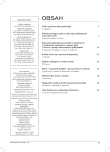-
Medical journals
- Career
Quality of life in women with urinary incontinence
Authors: L. Horčička
Authors‘ workplace: GONA s. r. o., urogynekologická ambulance, Praha
Published in: Čes Ger Rev 2009; 7(1): 22-25
Overview
Treatment success demonstrated through clinical assessment may differ from the subjective perception of treatment success by the patient herself. Quality of life has frequently been associated with the term ‘health’ as defined by the World Health Organization. The paper reviews the impact urinary incontinence may have on quality of life of women suffering from this condition. A specific study in women undergoing surgery for stress urinary incontinence serves as an example. The strongest correlation appears to be between quality of life and urodynamic diagnosis. Coping with urinary incontinence is worse in women with the diagnosis of detrusor instability than in women with genuine stress incontinence.
Keywords:
quality of life – urinary incontinence – irritable bladder – tension‑free tape sling
Sources
1. Amarenco G, Marquis P, McCarthy C et al. Efficacy of oxybutinin on health related quality of life. European Urology, Supp. of Congress EAU, 1997, Barcelona.
2. Lalos O, Berglund AL, Lalos A. Impact of urinary and climacteric symptoms on social and sexual life after surgical treatment of stress urinary incontinence in women: a long‑term outcome. J Adv Nurs 2001; 33 (3): 316 – 327.
3. Badia Llach X, Castro Díaz D, Conejero Sugran~es J. Validity of the King’s Health questionnaire in the assessment of quality of life of patient with urinary incontinence. The King‘s Group. Med Clin (Barc) 2000; 114 (17): 647 – 652.
4. Bidmead J, Cardozo L, McLellan A et al. A comparison of the objective and subjective outcomes of colposuspension for stress incontinence in women. BJOG 2001; 108 (4): 408 – 413.
5. Halaška M, Otčenášek M, Havel R et al. Závěs dolní třetiny uretry ambulantně – minimálně invazivní léčba stresové inkontinence moči – technika a první zkušenosti. Česk Gynek 2000; 65 (1): 4 – 9.
6. Olsson I, Kroon U. A three - year postoperative evaluation of tension‑free vaginal tape. Gynekol Obstet Invest 1999; 48 (4): 267 – 269.
7. Rezapour M, Ulmsten U. Tension - Free vaginal tape (TVT) in women with recurrent stress urinary incontinence – a long‑term follow‑up. Int Urogynecol J Pelvic Floor Dysfunct 2001; 12 (Suppl): S9 – S11.
8. Blanc E, Hermieu JF, Ravery V et al. Value of the use of a questionnaire in the evaluation of incontinence surgery. Prog Urol 1999; 9 (1): 88 – 94.
9. Conrad S, Pieper A, De la Maza SF et al. Long‑term results of the Stamey bladder neck suspension procedure: a patient questionnaire based outcome analysis. J Urol 1997; 157 (5): 1672 – 1677.
10. Donovan J, Naughton M, Gotoh M et al. Symptom and Quality of Life Assessment. In: Abrams P, Khoury S, Wein A (eds). Incontinence. Plymouth: Health Publications Ltd 1999.
11. Filbeck T, Ullrich T, Pichlmeier U et al. Correlation of persistent stress urinary incontinence with quality of life after suspension procedures: is continence the only decisive postoperative criterion of success? Urology 1999; 54 (2): 247 – 251.
12. Guillemin F, Bombardier C, Beaton D. Cross-cultural adaption of health‑related quality of life measures: literature review and proposed guidelines. J Clin Epidemiol 1993; 46 (12): 1417 – 1432.
13. Hassouna ME, Ghoniem GM. Long term outcome and quality of life after modif ed pubovaginal sling for intrinsic sphincteric deficiency. Urology 1999; 53 (2): 287 – 291.
Labels
Geriatrics General practitioner for adults
Article was published inCzech Geriatric Review

2009 Issue 1-
All articles in this issue
- A neurologist’s opinion of the management of subjects suffering from urine or stool incontinece
-
Jakou péči poskytujeme pacientům s inkontinencí v rezidenčních zařízeních a v domácí péči?
I. Názory a postoje zdravotnických profesionálů - Quality of life in women with urinary incontinence
- Antidepressants in the treatement of seniors
- Pain – undervalued problem in care of patients with dementia
- Quality of life assessment in seniors
- Diagnosis and treatment of temporal arteritis, a case study
- Our experience with subcutaneous rehydration
- Czech Geriatric Review
- Journal archive
- Current issue
- Online only
- About the journal
Most read in this issue- Our experience with subcutaneous rehydration
- Antidepressants in the treatement of seniors
- Diagnosis and treatment of temporal arteritis, a case study
- Pain – undervalued problem in care of patients with dementia
Login#ADS_BOTTOM_SCRIPTS#Forgotten passwordEnter the email address that you registered with. We will send you instructions on how to set a new password.
- Career

